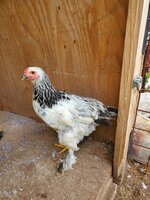Pickled Plaid
Songster
Apologies in advance for the length of this.
We got a random Brahma cross chick in a box of ducklings this summer, whose egg was laid in a broody duck's nest, and he was hatched alongside the ducklings. As luck would dictate, the chick is a cockerel.
He's always been brave, alert, and a dedicated leader of the ducklings - even at less than a week old. I can't even do a bedtime check on the duck pen (quietly, in the dark) without him alerting everyone. I think he has some stellar qualities that could potentially lead him down the path of Exceptional Roosterdom.
I'm very inexperienced with poultry, and less so with raising certifiable gentlemanly roosters! I'm sure cockerels are individuals, but is there anything I can do to help encourage his good traits, while minimizing his inner Captain Caveman as his hormones spike?
He's about 13 weeks old now, and still prefers the company of the ducks. "The girls" (five pullets, 4/5 laying) don't take him seriously, the girls mid-high on pecking order actively chase him. Top and bottom ranking girls ignore him.
They all free range on a fenced 3/4 acre yard all day, keeping to their own cliques. The pullets have a mobile tractor coop with a run they are secured in at night. The ducks and their guardian have a huge coop and fenced yard they're secured in at night. The cockerel has zero interest in the smaller coop.
All my pullets are large fowl, the smallest is the Welsummer who hasn't started laying yet. I know cockerels can get pretty crazy when they start learning how to be roosters, and this guy's size is a bit of a concern (he's definitely got the Brahma size). There's no way to know how he'll act until he acts.
Will continuing to free range everyone together, with 3/4 of an acre to run and hide be the best way to allow him to figure it out as the mood strikes (to prevent frustration), while giving the girls opportunities to get away if he attempts savagery?
Are gentlemen roosters gentlemen from the start, or...?
Aside from not handling him, but acclimating him to my presence as I work around the yard and in the garden, what else can I do to give him the best chance for success as a good rooster? We just culled our first aggressive rooster this weekend (he had always been a bit "off", but puberty turned him into a demon), and it's a road I'd prefer to keep this guy from traveling.
If it sounds like a recipe for disaster to more experienced chicken keepers, I'll redouble my efforts to find him a better home. I don't want this guy to go bad due to my ignorance. But if I can learn enough to help him grow and gain confidence and humility where necessary, I'm all for it. Thank you kindly in advance.

We got a random Brahma cross chick in a box of ducklings this summer, whose egg was laid in a broody duck's nest, and he was hatched alongside the ducklings. As luck would dictate, the chick is a cockerel.
He's always been brave, alert, and a dedicated leader of the ducklings - even at less than a week old. I can't even do a bedtime check on the duck pen (quietly, in the dark) without him alerting everyone. I think he has some stellar qualities that could potentially lead him down the path of Exceptional Roosterdom.
I'm very inexperienced with poultry, and less so with raising certifiable gentlemanly roosters! I'm sure cockerels are individuals, but is there anything I can do to help encourage his good traits, while minimizing his inner Captain Caveman as his hormones spike?
He's about 13 weeks old now, and still prefers the company of the ducks. "The girls" (five pullets, 4/5 laying) don't take him seriously, the girls mid-high on pecking order actively chase him. Top and bottom ranking girls ignore him.
They all free range on a fenced 3/4 acre yard all day, keeping to their own cliques. The pullets have a mobile tractor coop with a run they are secured in at night. The ducks and their guardian have a huge coop and fenced yard they're secured in at night. The cockerel has zero interest in the smaller coop.
All my pullets are large fowl, the smallest is the Welsummer who hasn't started laying yet. I know cockerels can get pretty crazy when they start learning how to be roosters, and this guy's size is a bit of a concern (he's definitely got the Brahma size). There's no way to know how he'll act until he acts.
Will continuing to free range everyone together, with 3/4 of an acre to run and hide be the best way to allow him to figure it out as the mood strikes (to prevent frustration), while giving the girls opportunities to get away if he attempts savagery?
Are gentlemen roosters gentlemen from the start, or...?
Aside from not handling him, but acclimating him to my presence as I work around the yard and in the garden, what else can I do to give him the best chance for success as a good rooster? We just culled our first aggressive rooster this weekend (he had always been a bit "off", but puberty turned him into a demon), and it's a road I'd prefer to keep this guy from traveling.
If it sounds like a recipe for disaster to more experienced chicken keepers, I'll redouble my efforts to find him a better home. I don't want this guy to go bad due to my ignorance. But if I can learn enough to help him grow and gain confidence and humility where necessary, I'm all for it. Thank you kindly in advance.








